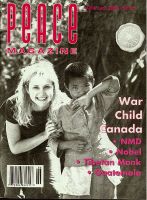
Peace Magazine Apr-Jun 2002, page 29. Some rights reserved.
Search for other articles by John Bacher here
David Cortright and George A Lopez
Former Minister of Foreign Affairs Lloyd Axworthy commissioned the writing of this remarkable book. It provides the most compelling case for mounting nonviolent solutions to the outrages by military dictatorships that provoke war. These are targeted sanctions, supported and strengthened by a vigorous internal democratic opposition.
The term "sanctions decade" shows that sanctions were a critical tool in shaping the hoped-for evolution of a democratic peace at the end of the Cold War. As Cortright and Lopez point out, this task has not been easy. While sanctions succeeded in the campaign against apartheid in South Africa, they have not been easily replicated in every case.
Sometimes, poorly targeted sanctions have been a factor in humanitarian suffering - most notably in Iraq. Sanctions were also unable to stop the genocide carried out in Rwanda, which resulted in 800,000 deaths. Cortright and Lopez, however, point out cases where, in the last decade, sanctions have contributed to peace. They also show how these tools can be targeted more directly on the dictators, arms dealers, and resource corporations that benefit from their evasion.
Sanctions worked effectively in Libya, where they were imposed after the 1988 explosion of Pam Am Flight 103 over Lockerbie, Scotland. Here the sanctions achieved their stated objective, the extradiction of four Libyan intelligence agents charged with involvement in the explosion. Not only did sanctions secure the trial of Libya's suspect agents, they also ended Libya's sponsorship of terrorism. The US State Department by 1996 concluded flatly that, "Terrorism by Libya has been sharply reduced by UN sanctions."
Cortright and Lopez give fascinating details on how the sanctions against Libya were able to be so effective.They note that "the sanctions adversely affected Libya's ability to refine and load petroleum by prohibiting trade in oil-related equipment. US sanctions deprived Libya of the licenses it needed for refining processes, which in turn reduced the availability of petroleum for domestic consumption....Sanctions cost Libya as much as $18 billion in lost revenue, primarily resulting from under-investment in the oil industry."
VICTORY IN CAMBODIA
Another victory for sanctions was in the destruction, as a political force, of the brutal Khmer Rouge in Cambodia. In 1993, although they controlled only 10 per cent of Cambodia's territory, the Khmer Rouge were able to finance their activities by pillaging Cambodia with clear-cut logging and open pit mining for the gem trade. They were raking in $20 million a month to finance their terrorist army, which sought to disrupt UN-sponsored elections. This caused the area around Pailin, the Khmer Rouge's unofficial capital, to become "a moonscape."
In reponse the the Khmer Rouge's pillage, the United Nations passed Resolution 792, which created an export ban. Although Thailand did not initially support the resolution, eventually it was pressured into establishing border checkpoints which in some cases slowed or halted the cross-border trade. These measures were further enforced by an oil embargo on the Khmer Rouge, which crippled some gem-mining operations.
Cortright and Lopez also point to Yugoslavia as illustrating the contribution of sanctions to peacefully ending conflict. They argue that sanctions, more than bombing, persuaded Serbian dictator Slobodan Milosveic to concede the Dayton Accords, which ended the war in Bosnia.
When American negotiator Richard Holbrooke met with Milosevic soon after the NATO bombing began, the Serbian leader did not raise the bombing until late in the meeting. Holbrooke observed that, "I was struck by his lack of emotions on the subject, in contrast...to his passion on the subject of lifting the economic sanctions."
The more targeted sanctions desired by Cortright and Lopez were a factor in the eventual demise of the Milosevic dictatorship a year after it survived the NATO bombardment over the issue of Kosovo. In the final year of Milosevic's rule, sanctions were more targeted, giving a break to municipalities for instance, that were controlled by democratic foes of Milosevic.
The repeal of sanctions were an important force behind making Yugoslavia a "normal country" in the words of the youth organization that, with assistance from the United States' National Endowment for Democracy, eventually defeated the Milosevic regime by mass nonviolent protests.
Cortright and Lopez end their book with an eloquent plea for the use of targeted sanctions to hit the bank accounts of dictators and their business friends. They point out, for instance, that the effectiveness of travel bans would be increased if, "in the cases of Angola and Sierra Leone, international diamond traders and oil company executives" were no longer able "to travel to these countries to do business with the targeted leaders....Banning contact and trade with sanctioned leaders would also prevent the further looting of the target country's resources for private gain."
Since September 11, simplistic solutions based on military force tend to dominate. This makes reading The Sanctions Decade more important than ever - to produce practical remedies for terrorism that do not involve military force, but target the criminal individuals in dictatorships and those who profit from transactions with them.
Reviewed by John Bacher, a Toronto writer.
"McNamara offers personal lessons learned from both the Vietnam War and the Cuban Missile Crisis while he uses the framework of President Woodrow Wilson's ideas to produce what I judge to be the most compelling realistic blueprint for a new American foreign and security policy..."
- Jan Oberg © TFF 2002
http://www.transnational.org/pressinf/2002/pf145_McNamara.html

Peace Magazine Apr-Jun 2002, page 29. Some rights reserved.
Search for other articles by John Bacher here